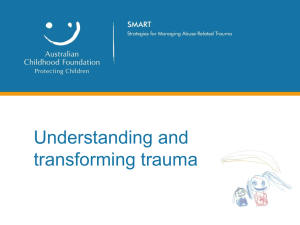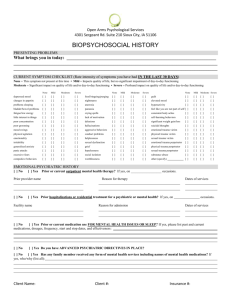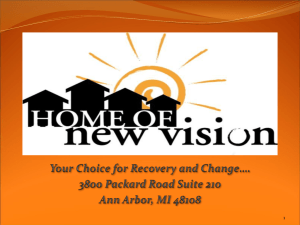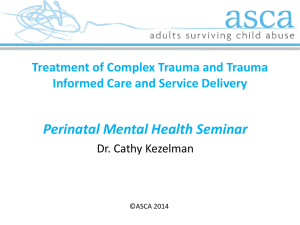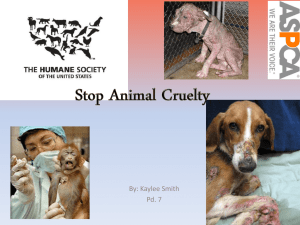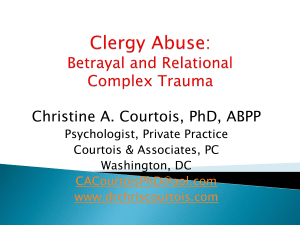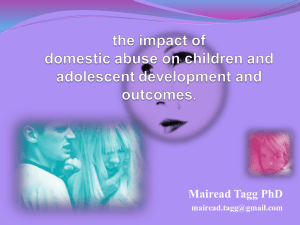Abuse, Addiction and Disclosure – contributing to recovery
advertisement
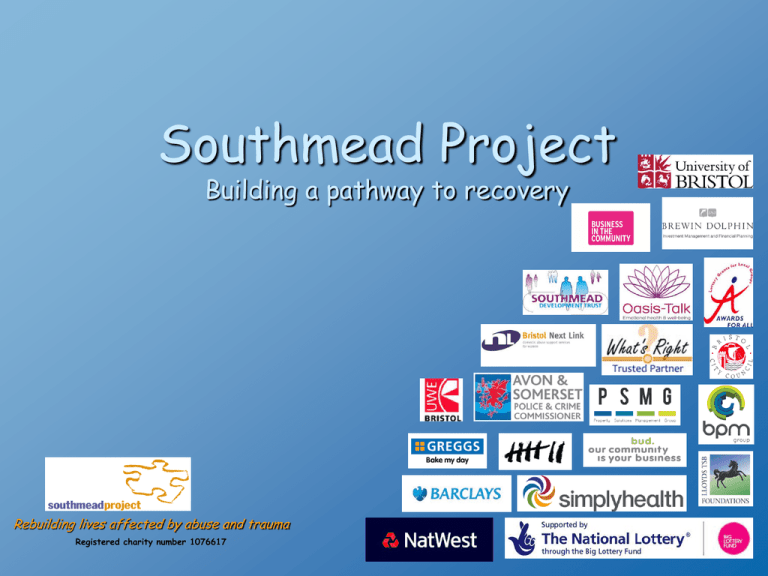
Southmead Project Building a pathway to recovery Rebuilding lives affected by abuse and trauma Registered charity number 1076617 Operations Counselling service for those who have experienced childhood trauma which has led to later drug or alcohol misuse or other ways of self-harming Comprehensive training programmes to enhance participants skills in working with the disclosure of abuse A support service for the parents and carers of those facing drug/alcohol dependency Gathering evidence on the impact of childhood trauma and its correlation with later dysfunction such as substance misuse and other forms of self-harm – used to inform public and policy makers Specialist abuse counselling o Specialist service for clients with complex needs including addiction, psychological distress, domestic abuse and experience of abuse or trauma in childhood o Structured group work – including prep group o Long or short term one-to-one counselling – including referrals through the IAPT programme o Encouraging clients to take responsibility for the pace of change and their own recovery Group Work Programme Creative Expression (as a means of Managing trauma) Drawing (i.e. Body map – how people see themselves – group sculpt) Writing (i.e. dialogue with the inner critic – we all have one of those!) Movement (i.e. boundary exploration/trust exercise-es) Music (i.e. songs can say so much) Narrative Therapy - ( Supportive Reflection on Self-esteem, Identity/Challenge negative life script) presenting the story of your life in a safe and respectful forum receiving supportive reflection of own life experience via others forming a new empowered sense of identity (new script) Mindfulness/Meditation (Being with whatever is/Stress Reduction) - practicing relaxation techniques - meditation in the midst of strong feelings - inviting people to connect with their own spirituality (i.e. nature, walks, etc.) Relationships/Experiential The full range of relationships (i.e. self, family, other group members etc) An opportunity to process anything that comes up during the group Monthly attention to relationships within the group The impact of trauma Stage 9 Recovery Stage 1 Capacity for love Stage 8 Counselling and motivational change programmes Stage 7 Treatment of presenting issues Stage 2 Capacity frozen by childhood trauma The revolving door Unless the underlying causal factors of self-harm are addressed through specialist interventions the likelihood of relapse is increased with huge cost implications Stage 6 Need for NHS &/or criminal justice intervention Stage 1: Stage 2: Stage 3: Stage 4: Stage 5: Stage 6: Stage 7: Stage 8: Stage 9: Stage 3 Dysfunction Stage 4 Self-harm Stage 5 Excess and dependency Human capacity for love, emotion and choice This capacity can be frustrated and frozen in childhood by trauma Dysfunctional behaviour e.g. violence, silence, self-harm, etc. Self-harming in order to suppress emotional pain The situation becomes compounded by excess and dependency The need for medical and/or criminal justice intervention becomes highly likely Access treatment services to address the presenting problem i.e. self-harming Specialist abuse / trauma counselling and motivational change programmes to address causal factors Recovery Abuse counselling statistics 2013 Clients’ abuse issues at assessment Clients by gender Male 29% 90% 80% 70% 60% 50% 40% 30% 20% 10% Female 71% Clients seen: 85 (60 female, 25 male) 0% Age range: l na ti o o Em 21-71 years Attendance: 79% al si c y Ph ti c s me o D xu Se al t l ec g Ne to tr a e rp Pe r Clients’ drug issues at assessment Number of referral sources: 16 70% 60% Number of statutory referral sources: 9 50% % of clients from NHS sources: 40% 46% 30% Other services provided included peer-led self-care support, drama therapy and family support groups and delivery of training Current Historic 20% 10% 0% ga Ille l ib cr s e Pr ed h co Al ol Cost to the State The following costs represent a case study for one service user over a period of 18 months prior to accessing Southmead Project: 8 visits to GP at £50 per visit: 6 CBT (Cognitive Behaviour Therapy) sessions at £62 per session: 2 Ambulance journeys to A&E at £337 per journey: 4 weeks residential mental health care at £805 per week: 52 hours community nursing at £48 per hour: Psychiatrist assessment: Pre-sentence report: 1½ years Probation order at £3,325 per annum: Total £400 £372 £674 £3,220 £2,496 £435 £175 £4,987 £12,759 Unit Costs of Health and Social Care (Curtis 2012 University of Kent) This amount does NOT include: overnight stay in A&E 999 crisis calls and medic responses night in police custody appearance at magistrates court appearances at crown court Training Abuse, addiction and disclosure - “Abuse, Addiction and Disclosure – contributing to recovery” is a two-day awareness training course for staff in other agencies working with those who selfharm - The overall aim of the training is to help participants understand the possible consequences of childhood trauma, the link between abuse and later self-harm and to increase their confidence when working with disclosure - Active learning raises awareness of our own attitudes about abuse enabling participants to hear and understand the reality and impact of childhood trauma - Survivors’ experiences are told in person and through DVD helping participants recognise how they can contribute to a client’s recovery “I feel so strongly that all professionals working to support people who have experienced any form of abuse NEED this training” Senior health promotion specialist, NHS Southmead Project Building a pathway to recovery Rebuilding lives affected by abuse and trauma Registered charity number 1076617

